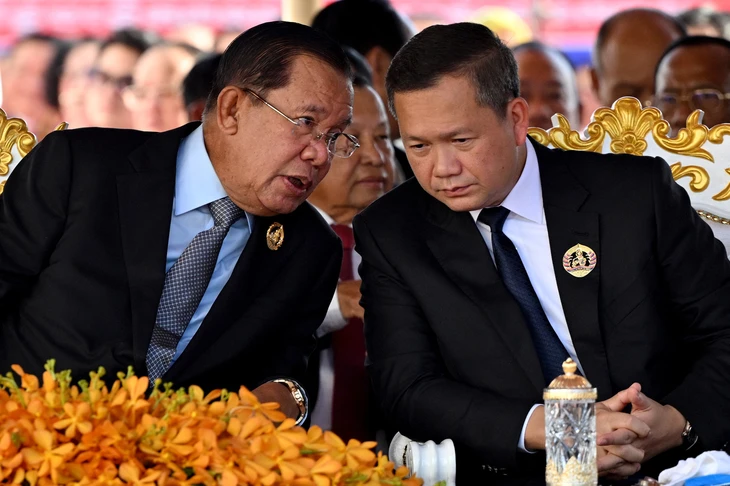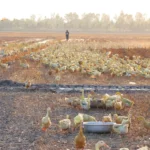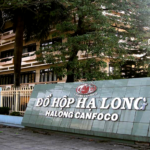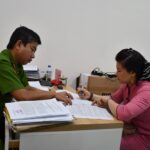Thai Ministry of Foreign Affairs denies social media claims that Bangkok plotted to assassinate Cambodian leaders Hun Sen and Hun Manet.
On August 5, the Thai Ministry of Foreign Affairs dismissed assassination plot allegations as baseless and defamatory. Bangkok claims these reports originated from Cambodia’s Ministry of Information.
Earlier, Khmer Times cited alleged foreign intelligence sources stating that Thailand planned to deploy light attack aircraft AT-6 TH, equipped with South Korean-made GPS-guided bombs, for a precision strike against both Cambodian leaders.
Nikorndej Balankura, spokesperson for Thailand’s Foreign Ministry, firmly denied these claims.
“I reiterate that spreading false news while both sides are engaged in discussions under the General Border Committee (GBC) not only undermines constructive efforts but also weakens the spirit of dialogue aimed at peaceful resolution,” Nikorndej was quoted as saying.
The Thai Foreign Ministry condemned the misinformation as a deliberate attempt to sabotage ongoing diplomatic efforts between Thailand and Cambodia.
According to intelligence reports cited by Khmer Times, the Thai Air Force tested the mentioned aircraft and bombs in the Phnom Troap area and began monitoring border developments from August 4.
If the Thai military fails to gain control over eight disputed border areas, they would conduct airstrikes using AT-6 TH aircraft from bases in Trat province—avoiding detection by Cambodia’s defense systems.
The source claimed Thailand awaited internal intelligence on precise GPS coordinates of Hun Sen and Hun Manet’s residences for a surprise assassination strike.
Thailand sues Cambodia over conflict damages
On August 5, Bangkok Post reported that Acting Thai Prime Minister Phumtham Wechayachai ordered officials to pursue domestic and international criminal and civil lawsuits against Cambodia for conflict-related damages.
Phumtham seeks legal action against Cambodia for deploying troops and weapons to attack Thailand.
According to the Thai government spokesperson, legal measures will follow domestic and international criminal and civil laws, along with other relevant statutes.
Bangkok aims to arrest and punish wrongdoers while demanding compensation from those responsible for the attacks in Cambodia.
Preliminary negotiations between Thai and Cambodian defense officials began on August 4 in Malaysia, ahead of the General Border Committee ministerial meeting.
Thai Ministry of Foreign Affairs
The Thai Ministry of Foreign Affairs (MFA) is the government body responsible for managing Thailand’s international relations and diplomatic affairs. Established in 1840 during the reign of King Rama III, it was formally organized as a ministry in 1892 under King Rama V (Chulalongkorn) as part of his modernization reforms. Today, it oversees Thailand’s foreign policy, embassies, and consulates, promoting diplomatic ties and international cooperation.
Cambodian Senate
The **Cambodian Senate** is the upper house of Cambodia’s bicameral parliament, established in 1999 under constitutional reforms. It serves as a legislative body that reviews laws passed by the National Assembly (lower house) and represents regional interests. The Senate was created to strengthen democratic governance, though it has been dominated by the ruling Cambodian People’s Party (CPP) since its inception.
General Border Committee
The General Border Committee (GBC) is a bilateral organization established by Cambodia and Vietnam to manage and resolve border-related issues between the two countries. Formed in 1995, it aims to promote cooperation, demarcate boundaries, and prevent disputes along their shared border. The committee reflects efforts to strengthen diplomatic ties and regional stability following historical tensions.
Khmer Times
The *Khmer Times* is an English-language newspaper based in Cambodia, established in 2014. It provides news on local and international affairs, business, and culture, aiming to offer balanced reporting in a media landscape often influenced by political pressures. While not a historical or cultural site itself, it plays a role in Cambodia’s modern media environment, reflecting the country’s post-conflict development and growing English-speaking audience.
Phnom Troap
Phnom Troap is a small hill and cultural site in Cambodia, located in the Kampong Speu Province. It is known for its historical significance and natural beauty, often associated with local legends and spiritual practices. The site is believed to have been used for meditation by monks and may have connections to Cambodia’s ancient Khmer heritage, though detailed historical records are limited.
Trat province
Trat Province, located in eastern Thailand near the Cambodian border, is known for its lush forests, pristine islands, and vibrant coastal culture. Historically, it was part of the Khmer Empire before coming under Thai control in the 18th century. Today, it is a popular destination for ecotourism and beach getaways, particularly for visits to the nearby Koh Chang archipelago.
Bangkok Post
The *Bangkok Post* is a leading English-language daily newspaper in Thailand, founded in 1946. It provides coverage of local and international news, business, politics, and culture, serving both expatriates and English-speaking Thais. Over the decades, it has become one of the country’s most respected sources of journalism, known for its independent reporting.
Malaysia
Malaysia is a diverse Southeast Asian country known for its rich cultural heritage, blending Malay, Chinese, Indian, and indigenous influences. Historically, it was a key trading hub, with parts of it colonized by the Portuguese, Dutch, and British before gaining independence in 1957. Today, it is famous for landmarks like the Petronas Twin Towers, lush rainforests, and vibrant festivals such as Hari Raya and Thaipusam.






